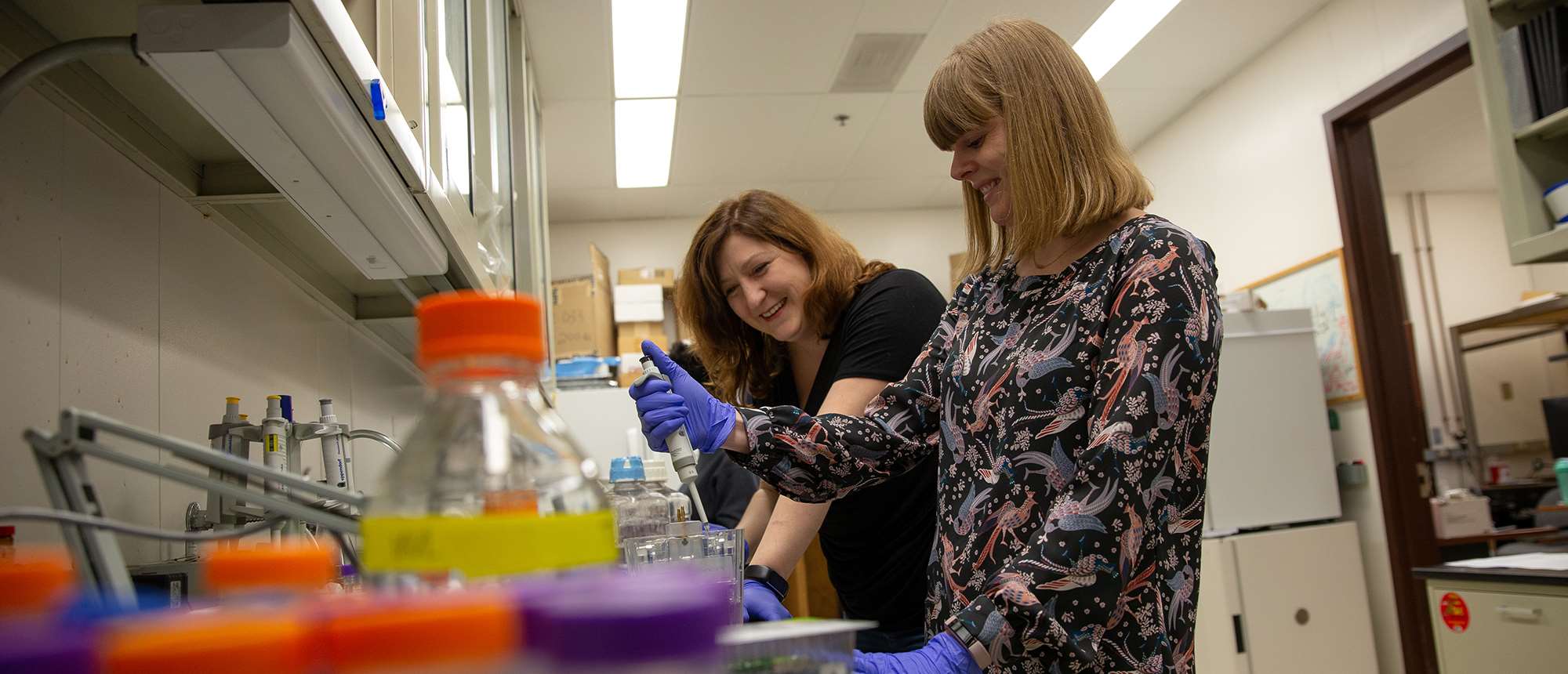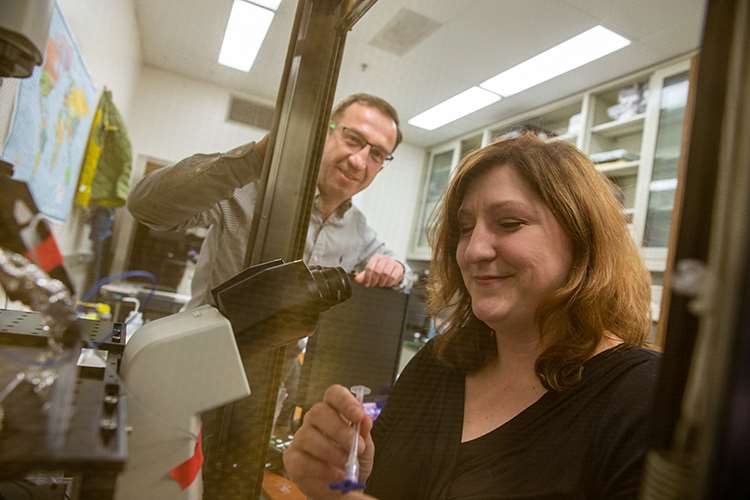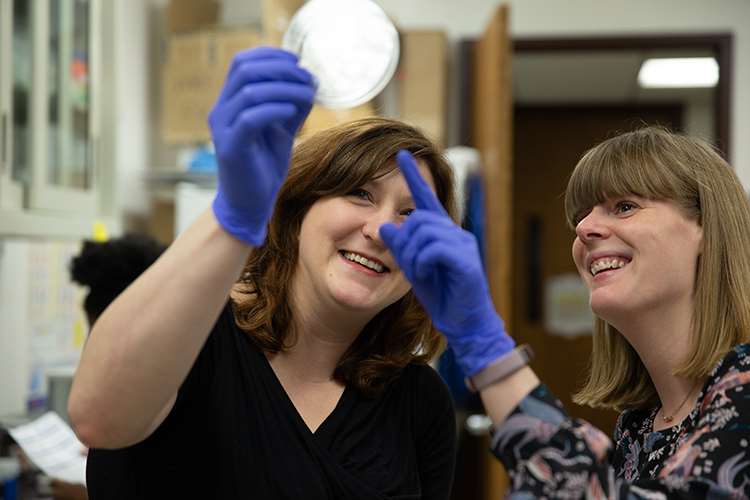Training the Next Generation of Cardiovascular Researchers

Christine A. Klemens, PhD, who was born in Pittsburgh but spent her high school years in Green Bay, always knew she'd have a career in medicine.
"My dad was a doctor, and mom was a dentist. It never occurred to me that it wasn't an option," says Dr. Klemens, one of two inaugural postdoctoral trainees on the Medical College of Wisconsin (MCW) Cardiovascular Center (CVC) National Institute of Health (NIH) T32 Training Program.
The program, which debuted in 2017, was created to help launch the careers of top cardiovascular researchers across the nation, whether in academia, medicine, the private sector or elsewhere. It is supported by a five-year $1.6 million grant from the NIH National Heart, Lung, and Blood Institute as well as funding from the A. O. Smith Foundation.
"Through this program, we're able to support our mission of training the next generation of cardiovascular scientists. The path to achieving that important goal requires personalized, supportive and rigorous training that will prepare these individuals for successful careers," says Ivor Benjamin, MD, professor of medicine at MCW, director of the CVC and co-director of the CVC's T32 Program.
Fellow co-director, David Gutterman, MD, Northwestern Mutual professor of cardiology and senior associate director of the CVC, describes the program as providing three years of supplemented stipend support, tuition and a training allowance for postdoctoral fellows with an MD, PhD, DO or PharmD. Trainees are mentored by teams of faculty embedded within the CVC's Signature Programs: Precision Cardiovascular Medicine; Cardiac Biology & Heart Failure; Atherosclerosis, Thrombosis, & Vascular Biology; or Hypertension.
"These unique strengths of our training program allow MCW to draw from a pool of some of the nation’s top talents in cardiovascular research," adds Dr. Gutterman.
Investigating Hypertension
Dr. Klemens is one of the first trainees appointed to the program. She studied molecular biology at the University of Wisconsin-Madison and earned her doctorate in cell biology and molecular biology at the University of Pittsburgh. Her doctoral work focused on characterizing the role of a scaffolding protein, ankryin G, in kidney function.
As part of her T32 training within the CVC's Hypertension Signature Program, she's working in the laboratory of her program mentor, Alexander Staruschenko, PhD, associate professor of physiology, and is co-mentored by Oleg Palygin, PhD, assistant professor of physiology. Under their guidance, Dr. Klemens is seeking to better understand how mutations in a voltage sensitive chloride channel affect blood pressure control in the kidneys.

"If we can better understand the various mutations of the chloride channel, more effective treatments for high blood pressure are possible," Dr. Klemens says.
High blood pressure, also known as hypertension, is an ailment that affects more than 100 million Americans, according to the American Heart Association, and can put individuals at increased risk to suffer kidney failure, stroke and heart attack, Dr. Klemens adds. Through her research, she hopes to shed more light on chloride channel 6, describing it as an understudied transmembrane protein.
"No one really has a strong idea of what this particular protein does. There's very little research on it," she says.
Dr. Staruschenko, who began studying this channel several years ago, says having someone with Dr. Klemens' skill set in the laboratory is a great benefit.
"When people join my lab, I always try to see what they can do, what they know and how I can utilize their skill," he says. "Dr. Klemens is a great communicator and team player who brings a great deal of expertise that will help our research answer very specific questions about the role of chloride channels in hypertension."
Focus on Diabetes
In addition to appointing a T32 trainee in its Hypertension Signature Program, the CVC recruited a postdoctoral trainee into its Atherosclerosis, Thrombosis & Vascular Biology Signature Program. Jennifer S. Stancill, PhD, joined the lab of her primary mentor, John Corbett, PhD, chair and professor of biochemistry, just a few months ago and is co-mentored by Rebekah Gundry, PhD, associate professor of biochemistry. Dr. Stancill received her Bachelor of Science at the University of North Carolina, her home state, in 2011 and went on to earn her doctorate in cell and developmental biology at Vanderbilt University last year. She will be working on a project that builds upon her doctoral research on gene expression and beta cell physiology by investigating why beta cells become dysfunctional in type 2 diabetes.
"Beta cells help regulate blood sugar levels, but in type 2 diabetes, these cells fail," Dr. Stancill explains. "The ultimate goal of my research is to better understand mechanisms contributing to beta cell failure and to find out why this happens in some individuals with insulin resistance, but not in others. The goal for the entire community of researchers in this area is to understand why beta cells are failing and possibly reverse it."
An estimated 30 million Americans have diabetes, more than 9 percent of the U.S. population, according to data from the Center for Disease Control (CDC) National Diabetes Statistic Report for 2017. In recent years, diabetes has ranked in the top 10 leading causes of death in the United States and people with diabetes are at a greater risk for heart disease and stroke, found the report.
According to Dr. Corbett, researchers within the diabetic community think that beta cells are extremely sensitive to oxidative stress, but studies from his laboratory suggest otherwise. Dr. Stancill, along with six other researchers in Dr. Corbett's laboratory, will help bring new knowledge to this area with her experience in genetics and prior research on how gene expression is controlled in beta cells.
"She's a wonderfully creative scientist who is not afraid to try anything new. The team is combining her expertise with theirs to push the boundaries of this study," Dr. Corbett says.
As co-directors of the T32 program, Drs. Benjamin and Gutterman laud this work as it is likely to provide insights into how beta cells function, insights that could be the key to unraveling new treatments for diabetes and lowering the risk for heart and blood vessel diseases.
Advancing Innovation Through Education
Aside from honing research skills with oversight by mentoring teams, other major components of the CVC's T32 Program are the creation of an Individualized Development Plan (IDP) and structured guidance in cultivation of professional skills, including writing grants and publishing manuscripts.
The IDP, according to Dr. Benjamin, tailors training to match the career goals of each trainee while ensuring that all foundational elements of professional skills are learned. This living document provides a roadmap for training that is constantly being monitored and modified by mentors and trainees and also encourages trainees to continually assess their own skills and interests and how they can be matched with the array of resources at MCW.
"That way we can optimize their training," says Dr. Benjamin, "and it will allow MCW an opportunity to take advantage of its excellent resources and vaulted position as an academic medical center."

The CVC will add two new trainees annually over the next four years. The plan is for the trainees to continue to connect with the four broad priority areas within the CVC: studying personalized medicine and heredity; heart structure and function; plaque, clots and blood vessel health; and high blood pressure.
As for Dr. Stancill, who plays clarinet in a Wauwatosa community band, and Dr. Klemens, who has a trained therapy dog and enjoys hiking, their career goals are to become primary investigators in their own laboratories. They both feel strongly that participation in the CVC’s T32 Training Program is a giant step in that direction.
"The Medical College of Wisconsin Cardiovascular Center has an excellent track record of producing researchers that proceed to the next level." Dr. Klemens says. "I strongly believe I'm being provided with the right guidance and academic support in order for that to happen."



